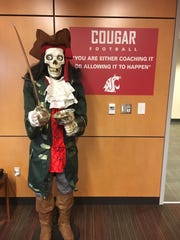https://www.theringer.com/2018/8/14/17685080/air-raid-offense-mike-leach-lincoln-riley
The Case for the NFL’s Air Raid Revolution
Long known as college football’s most prolific offensive system, the Air Raid is labeled as a gimmick that won’t work in the NFL. If recent results are any indication, perception doesn’t align with reality.
By
Rodger Sherman
Aug 14, 2018, 8:35am EDT
It’s often said that college football and the NFL are two completely different sports. But many concepts that long thrived on campus have recently taken hold in the league. We’re spending today examining the intersection of both levels of the game, and how certain schemes and tendencies are shaping the future of the modern pro offense.
2017 was the year the Air Raid quarterback succeeded in the NFL.
For years, we’ve been told that quarterbacks who played their college ball in the game’s most explosive offense couldn’t cut it in the pros. Tim Couch, the Kentucky product who was taken no. 1 overall in the 1999 draft, went on to have a dismal career; Brandon Weeden, the Oklahoma State star who was a 2012 first-round pick, quickly proved he was better suited to be a backup than a starter; Johnny Manziel, the Texas A&M Heisman Trophy winner who became a 2014 first-rounder, failed out of the league within two years. (It’s possible that the common link here was the Cleveland Browns.)
But last year bucked the trend. Jared Goff, the Cal product who once piloted the Bear Raid offense under head coach Sonny Dykes, led the Rams to the playoffs while ranking fifth in the NFL in passer rating and second in adjusted yards per attempt. Case Keenum, whose co-offensive coordinator at Houston was Kliff Kingsbury, lifted the Vikings to the NFC championship game and ranked second in QBR. And Nick Foles, whose coordinators at Arizona were Dykes, Bill Bedenbaugh, and Seth Littrell, was named Super Bowl MVP with
the Eagles. The common link? Dykes, Kingsbury, Bedenbaugh, and Littrell all had worked with or had been coached by current Washington State head coach Mike Leach, the Air Raid whisperer.
Still, some NFL minds worry that Air Raid passers can’t thrive in the NFL. The Air Raid, they contend, lacks the complexity required of a professional offense. The reads that Air Raid quarterbacks have to make are too simple; the throws to receivers are too wide open. When these QBs get to the league, the thinking goes, they won’t be able to adequately decipher opposing defenses or hit the throws they’ll need to make.
This was the case against selecting Oklahoma’s Baker Mayfield first overall in the 2018 NFL draft. The Air Raid stigma affects nonquarterbacks, too; when Cleveland traded 2016 first-round pick Corey Coleman to Buffalo last week, some argued it was because Coleman’s experience playing in an Air Raid offense at Baylor had left him
ill prepared to play wide receiver in the NFL. (Coleman also played for the Browns. I’m sensing a trend here. Mayfield might be doomed.)
When it comes to the Air Raid, I believe those in the NFL are asking the wrong question. We shouldn’t be trying to figure out whether players like Mayfield can make every tough throw. We should be wondering why NFL coaches are so steadfast in forcing quarterbacks to make tough throws in the first place. Why do teams keep looking for great quarterbacks, instead of running the system that consistently makes bad quarterbacks look great?
Cont'd ...



 Real tough when they hit those teenage years. Dear god, the guy is amazing. Link below for the whole thing.
Real tough when they hit those teenage years. Dear god, the guy is amazing. Link below for the whole thing.


